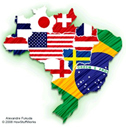By Lúcio Vaz
A study by a Federal Public Ministry (MFP) working group on the purchase of land in the country demolishes the idea that Brazilian companies controlled by foreign capital should receive the same treatment in these purchases as companies by national capital.
The idea of giving foreign-controlled companies separate treatment was rejected for years by the Brazilian government and has resulted in little being known about the location and dimension of properties acquired by foreign capital. In order to be able to control the action of multinationals, the federal government announced ten days ago a change in the ruling of the Solicitor-General of the Union (AGU), which had determined that Brazilian companies controlled by foreigners should not be obliged to receive a certificate from the National Institute of Colonisation and Agrarian Reform (INCRA) before purchasing estates.
The MPF working group first verified that the federal government does not, in fact, have control over the areas controlled by foreigners. This was made clear by a simple fact, as the federal prosecutor Marco Antonio Almeida, a member of the working group, explained: “Just by having a company registered in Brazil, even if that company is controlled by foreigners, is enough for a foreign company to be treated as a national company, which shows that the government is not in control.”
The prosecutors then undertook an analysis of the Federal constitution. Article 171, which establishes privileges for national capital companies, was revoked by an amendment in 1995. But article 190 was maintained. It reads: “The law will regulate the acquisition or leasing of rural properties by foreigners or foreign companies.” The working group concluded that there is no incompatibility between Law no. 5,709/1971, which deals with this theme, and the 1988 Constitution.
Norms undermined
Law 5,709 establishes the way in which a foreigner resident in the country and a foreign company registered to operate in Brazil can acquire rural property. And it makes clear that a Brazilian company in which foreigners, or companies in which foreigners or companies with their headquarters abroad have a majority stake, is subject to this law.
The MPF study points out that Law no. 8,629/1993, approved after the 1988 Constitution, makes it clear that a foreigner resident in the country and a company authorised to operate in Brazil can only lease land as established by Law no. 5,709/71. And it says that all the limits and restrictions on the acquisition of rural property by foreigners established in Law no. 5,709 should apply to leasing too.
The prosecutors concluded that any other interpretation would “lead to the undermining of the norm, because it would allow foreigners or foreign companies to evade any controls over the dimension and location of land acquired by them merely by setting up a Brazilian company.” So the group recommended that real estate companies should inform INCRA of any purchase of land by foreigners.
Neocolonialism
Almeida stresses that it is not just a legal question but a political and economic one too. “To tell the truth, there is something underway in the world today called neocolonialism. It isn’t an ideological question but a factual question. China is buying land in Africa and Brazil. There is a purchase predicted of over 200,000 hectares in Mapito (region that brings together the poorer areas of the states of Maranhão, Piauí e Tocantins). This is harmful. There will be problems around relative prices. And why does China want to produce soya? It’s because it doesn’t want to pay the prices it is currently paying for importing soya.”
He points put that in Africa this issue is relevant to food sovereignty because the land could be producing food in the country in question. “In Brazil, it is an economic question. Today China can buy as much land as it likes. It only has to set up a Brazilian company. Look what Stora Enso (a Swedish-Finnish company) did: it set up companies in Brazil to buy land in Rio Grande do Sul. China has done the same thing. It’s a clear threat to our sovereignty.”
The prosecutor says that what permits this is legal loophole, which allows these companies, using the supposed fact of being Brazilian, to acquire land without limits in Brazil. “Where control is demanded, it is not effective. So we have a huge amount of land that is outside any kind of control.













